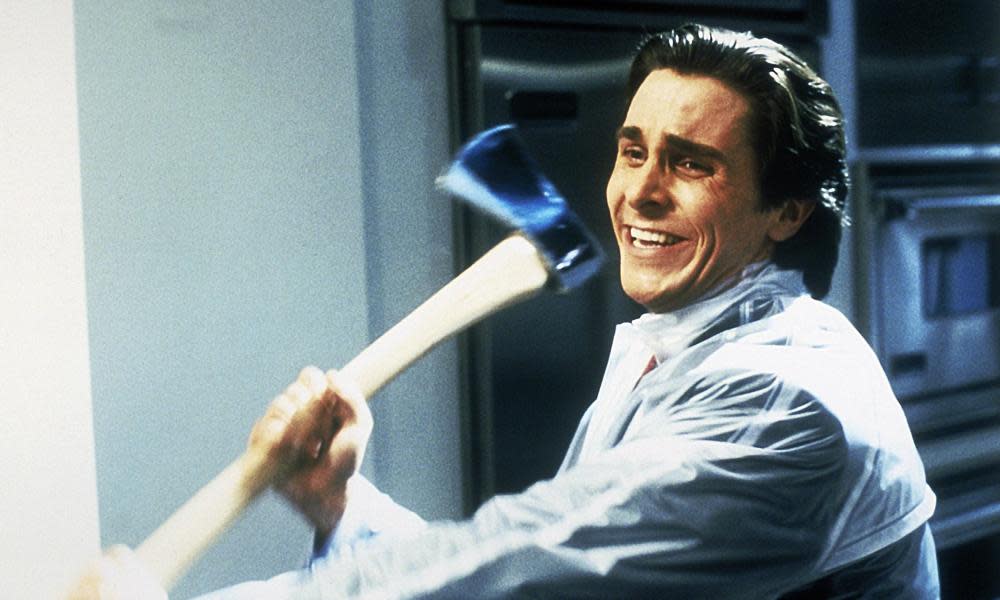What do female film-makers have to say about male stories?

When Ana Kokkinos found out her second film was going to be shown at Cannes in 1998, she was overjoyed. Charting 24 hedonistic hours in the life of a gay Greek-Australian teenager, Head On is a fierce and evocative depiction of queer identity and masculinity in crisis. Then she had her first interview. “The journalist told me there was a rumour that I must have been a man because a woman couldn’t possibly make this film.”
The Australian film-maker was unsurprised. “There aren’t many female directors and when women get the opportunity to make a film they tend to want to make them about women. But when women make films about men there is still a taboo around that. There’s a cliched view that women can’t explore masculinity or the male experience.”
Related: Masculinities review: men laid bare from boardroom to battlefield
It’s this misconception that the Barbican’s new season, Her Lens, His Story: Female Directors and Masculinities, seeks to upend. Kokkinos is one of seven female directors from around the world whose stories about men will be shown. The series of screenings is a celebration of women who have fought to show multifaceted and vulnerable men on screen.
These are stories about men living on the margins, maverick outsiders for reasons other than bravado or bank robbery. In Edith Carlmar’s stylish 1949 Norwegian noir Death Is a Caress, about a mechanic who falls for a rich, older woman, this is due to the rigid class system. In Destiny Ekaragha’s Gone Too Far!, a witty 2013 British comedy about two estranged brothers meeting for the first time, it’s down to the colour of their skin.
Sexuality keeps its protagonists marginalised in both Anahí Berneri’s 2005 Argentinian film A Year Without Love, about a lonely poet with HIV who looks for human connection in S&M clubs, and Kokkinos’s Head On. Meanwhile, a young Afghan boy in 1980s Kabul is forgotten by society in Shahrbanoo Sadat’s sensitively told 2019 drama The Orphanage.
There are antiheroes, too, as depicted in Soviet director Larisa Shepitko’s harrowing 1977 film The Ascent, which shows the different fates of two soldiers captured during the second world war and their struggle to cope with the brutality of conflict. While 1953’s Love Letter, a poignant melodrama from prolific film star Kinuyo Tanaka (the second woman ever to work as a director in Japan), reflects the postwar anxieties of the country in its story about an emotionally repressed man struggling to forgive his ex-girlfriend.
It’s liberating for women to explore men, because we’re not shackled by the same assumptions about the male experience.
Portraying men in a non-traditional way, free from cliche, is a political act, says Kokkinos. Her own film was considered controversial when it was released for its gritty depiction of gay sex and drugs. But it also gives a voice to the immigrant experience. “It didn’t idealise privileged men in positions of power. The minute you don’t depict men as powerful drivers of their own destinies, people find that very difficult.”
The number of female directors in the film industry is slowly growing but is still dismally low. Last month, a study by the Annenberg Inclusion Initiative at the University of Southern California found that of the 113 directors behind 2019’s 100 top-grossing films, 12 of these were women – a historic high. In 2018, there were just five. And when women do direct, they are more likely to focus on stories about women.
Yet when focused on men, the female gaze can offer radical new perspectives. Gone Too Far! director Ekaragha can still remember watching Point Break for the first time, not realising the adrenaline-fuelled action thriller was directed by a woman, Kathryn Bigelow, until years later. In her 20s, she was captivated by Mary Harron’s gruesome psychological horror American Psycho – in particular, how the camera lingered on Christian Bale’s sculpted body – in much the same way men have been filming women’s bodies for years.
“The moment I realised I wanted to be a director, I felt like a lot of the films expected of women were not necessarily the sort of films that I was into,” she says. “To see a woman direct American Psycho with no fear was inspiring.”
The south London director, one of only four black British women to have had their feature films released in UK cinemas, actively avoided any stereotypes associated with black teens, such as drugs and stabbings, when making her film. “I was conscious of how black boys and black men are portrayed on screen.”
For Afghan film-maker Sadat, the gender of the people on screen is of secondary importance.
Related: Destiny Ekaragha: ‘I’ve got to break two glass ceilings’
“After #MeToo, people are showing more support for female film-makers and stories about women,” she says. “For me, it doesn’t really matter if [the film is about] a man or a woman. It’s important who’s behind the camera and how the director is trying to show the world from a feminine point of view.”
Kokkinos followed Head On with The Book of Revelation, about a male dancer who is abducted by three women. “It’s liberating for women to explore men because we’re not shackled by the same assumptions about the male experience,” she says.
“Women have something to say about men. We can delve into their vulnerabilities or difficulties around their own maleness. We need more women to enter that space because it becomes really exciting. We can illuminate something different about men that we don’t generally see from men themselves.”
Her Lens, His Story: Female Directors and Masculinities is at the Barbican, London, from 26 February to 10 March.


